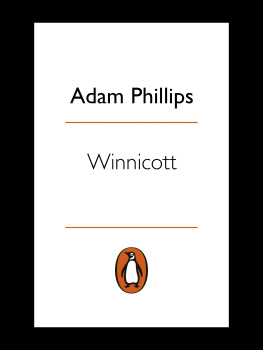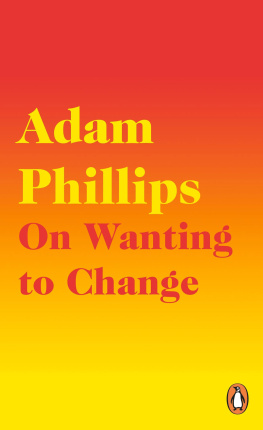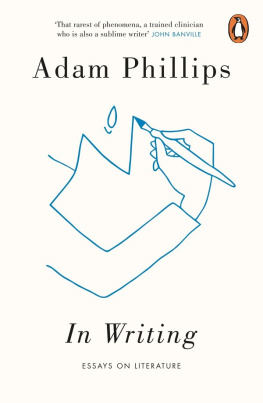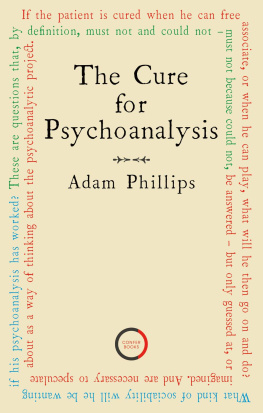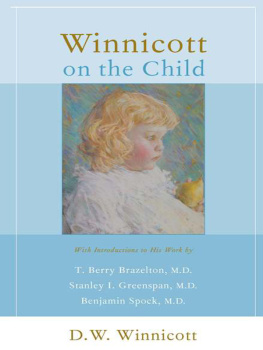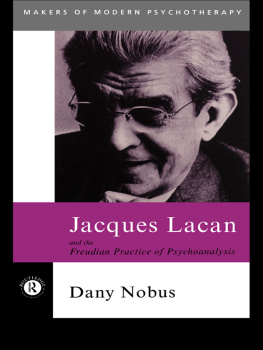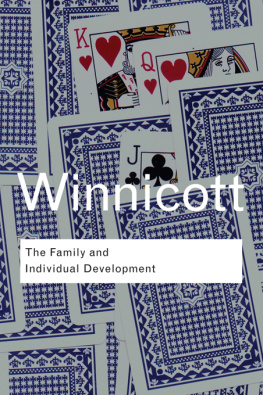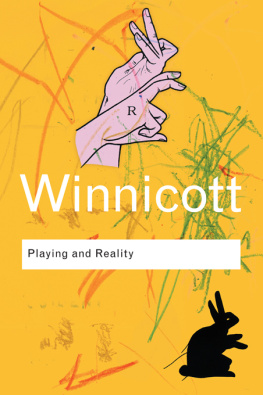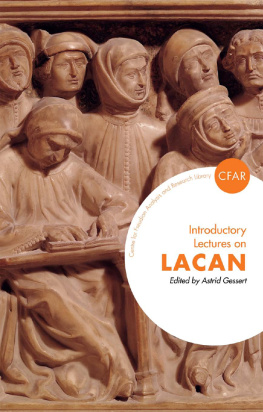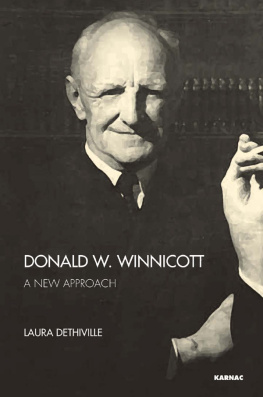PENGUIN BOOKS
WINNICOTT
Adam Phillips was formerly Principal Child Psychotherapist at Charing Cross Hospital in London. He is the author of several books, most recently Going Sane and Side Effects, and is the general editor of the New Penguin Freud.
Winnicott
Adam Phillips
with a new Preface by the author

PENGUIN BOOKS
PENGUIN BOOKS
Published by the Penguin Group
Penguin Books Ltd, 80 Strand, London WC2R 0RL , England
Penguin Group (USA) Inc., 375 Hudson Street, New York, New York 10014, USA
Penguin Group (Canada), 90 Eglinton Avenue East, Suite 700, Toronto, Ontario, Canada M4P 2Y3
(a division of Pearson Penguin Canada Inc.)
Penguin Ireland, 25 St Stephens Green, Dublin 2, Ireland (a division of Penguin Books Ltd)
Penguin Group (Australia), 250 Camberwell Road, Camberwell, Victoria 3124, Australia
(a division of Pearson Australia Group Pty Ltd)
Penguin Books India Pvt Ltd, 11 Community Centre, Panchsheel Park, New Delhi 110 017, India
Penguin Group (NZ), 67 Apollo Drive, Rosedale, North Shore 0632, New Zealand
(a division of Pearson New Zealand Ltd)
Penguin Books (South Africa) (Pty) Ltd, 24 Sturdee Avenue,
Rosebank, Johannesburg 2196, South Africa
Penguin Books Ltd, Registered Offices: 80 Strand, London WC2R 0RL , England
www.penguin.com
First published by Fontana Paperbacks 1988
Published with a Preface in Penguin Books 2007
1
Copyright Adam Phillips, 1988, 2007
All rights reserved
Except in the United States of America, this book is sold subject to the condition that it shall not, by way of trade or otherwise, be lent, re-sold, hired out, or otherwise circulated without the publishers prior consent in any form of binding or cover other than that in which it is published and without a similar condition including this condition being imposed on the subsequent purchaser
ISBN: 978-0-14-192860-9
For PAUL VAN HEESWYK
CONTENTS
Preface
Some people go about the world terrified of losing their tempers, Winnicott wrote in 1944, in a talk called Why Do Babies Cry?,
afraid of what would have happened if they had experienced rage to the fullest extent when they were infants. For some reason or other this never got properly tested out. Perhaps their mothers were scared. By calm behaviour they might have given confidence but they muddled things up by acting as if the angry baby was really dangerous.
This, one could say, is an emblematic piece of Winnicott; Winnicott does not assume that he knows the reason, but he has a strong, tentative suggestion about the beginnings of the terror. And the child, who has become the adult with a stifling fear, is not assumed to have been suffering from his putative nature, but from how it was received. It is the mothers response that is taken to be formative, just as what is essential for Winnicott about interpretations in a psychoanalytic treatment is not their content, or the intention behind them, but what is made of them by the so-called patient. It is not the given thing but what the given thing can be transformed into that matters. Our words are not misunderstood, they are just more or less usefully heard.
So it is important that we dont read Winnicott too literally, dont assume that when he is talking about mothers and infants, as he almost always is, that that is all he is talking about. It is as though Winnicott realized that talking about mothers and babies was a way of saying things about couples that he wouldnt otherwise have been able to say. It is not that Winnicott isnt really talking about mothers and babies, but that he is also using mothers and babies to talk about other things as well: both sexuality and a persons relationship with themselves. If we read rage and anger in the above example as sexual desire, and think of the mother and infant as a desiring adult couple, more is released into the picture.
And the writing, above all, is not dogmatic, not full of conviction by calm behaviour the mother might have given confidence, but she might not: it is for some reason or other that the rage was never tried out because reassuring certainties and guiding principles are not available when we talk about what goes on between people. Winnicott is testing out his idea on the reader. A baby in a rage, he continues, is very much a person. He knows what he wants, he knows how he might get it, and he refuses to give up hope. It is the hope in this fanaticism that Winnicott is interested in (not to mention the rage in states of conviction). But Winnicott doesnt want to give rage, or indeed the idea of being very much a person, a bad press. He is most interested in what it might be, in his language, to be very much a person, to be as alive as one might have it in oneself to be. It is perhaps surprising to find a psychoanalyst in the British tradition with so many affinities to Nietzsche.
Psychoanalysis has never been interested in sexuality in itself, but only in sexuality as the revelation of personal history; sex in the service of memory. In psychoanalysis sex is integral to the individuals use and abuse of history. So Winnicott, it should be said now, is one of the very few great psychoanalytic writers about the experience of sexuality, though at the time of writing this book I couldnt see this quite so clearly; I could only see Winnicotts acknowledgement of the disturbing urgencies of instinctual life through his resistance to any explicit account of sexuality and his often-stated sense of just how disruptive instinctual desire was for the growing child (instinct being that which, in Winnicotts writing, sabotages play). But his ideas about aliveness, ruthlessness, and the use of an object; his preoccupation with alternatives to what he calls guilt-driven labour his anti-reparational story about desire are a radical redescription of erotic possibility.
I knew these issues were central for Winnicott when I wrote this book but I had let myself be persuaded that Winnicotts only blind spot as a psychoanalyst was sexuality; that of course it mattered but it wasnt, as it was for Freud, the be-all and end-all. But when Winnicott writes about what babies do and dont want to do with and to their mothers (and vice versa); when he writes about solitude and the individuals need not to be known At the start is an essential aloneness. At the same time this aloneness can only take place under maximum conditions of dependency (Human Nature); when he writes about the figure he calls the artist, he is also writing about sexuality, and about the essential impersonality of desire.
The individual, Winnicott often intimates without ever quite asserting it, is at his most idiosyncratic when he is at his most anonymous; compliance is what we have invented personality for. Desire, aliveness, creative living require something quite different. To be on the side of what he called in a letter the more subtle communication which is the only basis for communication that does not violate the fact of the essential isolation of each individual (to W. R. Bion, 7 October 1955) is to promote a very unusual picture of both how communication might work, and what it might be for. It is a picture in which being violated is the greatest threat to the individual, and in which so-called relationships are always the scene of potential violation. But what can be violated by communication is the individuals essential isolation. It is not incidental that the psychoanalytic writer who has more to say about relationship than virtually any other writer in the field has so much to say about the politics of solitude. If Rousseau was, as it were, the master of solitude, a solitude born of persecution, Winnicott is a great apologist for the gifts of solitude, a solitude born of dependence.
Next page
